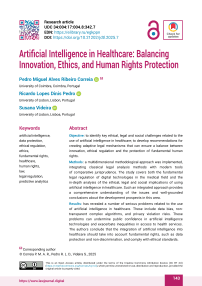Artificial Intelligence in Healthcare: Balancing Innovation, Ethics, and Human Rights Protection
Автор: Correia P. M. A. R., Pedro R. L. D., Videira S.,
Журнал: Journal of Digital Technologies and Law @lawjournal-digital
Статья в выпуске: 3 (1), 2025 года.
Бесплатный доступ
Objective: to identify key ethical, legal and social challenges related to the use of artificial intelligence in healthcare; to develop recommendations for creating adaptive legal mechanisms that can ensure a balance between innovation, ethical regulation and the protection of fundamental human rights. Methods: a multidimensional methodological approach was implemented, integrating classical legal analysis methods with modern tools of comparative jurisprudence. The study covers both the fundamental legal regulation of digital technologies in the medical field and the in-depth analysis of the ethical, legal and social implications of using artificial intelligence in healthcare. Such an integrated approach provides a comprehensive understanding of the issues and well-grounded conclusions about the development prospects in this area. Results: has revealed a number of serious problems related to the use of artificial intelligence in healthcare. These include data bias, non-transparent complex algorithms, and privacy violation risks. These problems can undermine public confidence in artificial intelligence technologies and exacerbate inequalities in access to health services. The authors conclude that the integration of artificial intelligence into healthcare should take into account fundamental rights, such as data protection and non-discrimination, and comply with ethical standards. Scientific novelty: the work proposes effective mechanisms to reduce risks and maximize the potential of artificial intelligence under crises. Special attention is paid to regulatory measures, such as the impact assessment provided for by the Artificial Intelligence Act. These measures play a key role in identifying and minimizing the risks associated with high-risk artificial intelligence systems, ensuring compliance with ethical standards and protection of fundamental rights. Practical significance: adaptive legal mechanisms were developed, that support democratic norms and respond promptly to emerging challenges in public healthcare. The proposed mechanisms allow achieving a balance between using artificial intelligence for crisis management and human rights. This helps to build confidence in artificial intelligence systems and their sustained positive impact on public healthcare.
Artificial intelligence, data protection, ethical regulation, ethics, fundamental rights, healthcare, human rights, law, legal regulation, predictive analytics
Короткий адрес: https://sciup.org/14131902
IDR: 14131902 | УДК: 34:004:17:004.8:342.7 | DOI: 10.21202/jdtl.2025.7


